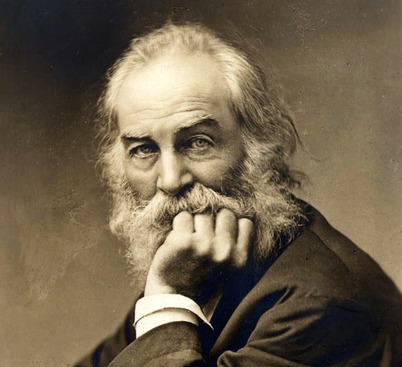I only teach the first fifteen stanzas of "Song of Myself," but that's more than enough for two, full hours of conversation.
I ease into Whitman through Emerson, following the footsteps of my predecessor at the OHS, Adam Rzepka. After leaving the OHS, Dr. Rzepka became an assistant professor at Montclair State University in New Jersey. I had the great pleasure of meeting him at the most recent SAA in St. Louis. What a treat to make friends with someone from whom I have learned so much!
So some key passages in Emerson to share in a discussion of Whitman would be from the essays "Nature" (which lays out the intellectual framework for the Transcendentalist movement) and "The Poet" (which calls for a great poet to become the voice of a new American poetry). Emerson similarly influenced Thoreau, so thinking about how Whitman and Thoreau each take something different from Emerson is a productive way into all three authors.
From "Nature"
To go into solitude, a man needs to retire as much from his chamber as from society. I am not solitary whilst I read and write, though nobody is with me. But if a man would be alone, let him look at the stars...
The stars awaken a certain reverence, because though always present, they are always inaccessible; but all natural objects make a kindred impression, when the mind is open to their influence. Nature never wears a mean appearance. Neither does the wisest man extort all her secret, and lose his curiosity by finding out all her perfection. Nature never became a toy to a wise spirit. The flowers, the animals, the mountains, reflected all the wisdom of his best hour, as much as they had delighted the simplicity of his childhood.
From "The Poet"
Wherever snow falls, or water flows, or birds fly, wherever day and night meet in twilight, wherever the blue heaven is hung by clouds, or sown with stars, wherever are forms with transparent boundaries, wherever are outlets into celestial space, wherever is danger, and awe, and love, there is Beauty, plenteous as rain, shed for thee, and though thou shouldest walk the world over, thou shalt not be able to find a condition inopportune or ignoble.
I ask students to read Whitman as eschewing or disregarding what others might think of as inopportune or ignoble, and I propose that he does so by dissolving boundaries and expectations. We discuss boundaries that are so common that we almost expect to see them, as if they are "natural" ways of dividing up the world into discrete categories, often paired as binaries:
- Self and other
- Types of others, either through race, class, or profession
- Civilization and nature
- Man and woman
- Young and old
- Geographical difference
- Historical difference
- Human and animal
- Dead and alive
Then we look for how Whitman treats these supposedly natural binaries or hierarchies. In every instance, I ask my students what is his tone here? With the exception of the slave holder, Whitman embraces every possible facet of American life in these poems. They are often amazed at his absolute renunciation of shame.
Particularly productive stanzas are stanzas 1 (self and other), 6 (living and dead), 10 (geographical, racial, and historical difference), 11 (men and women), 13-4 (animals and human), and 15 (class and professional differences).
Another productive in-road has been to ask students to imagine this as an extended documentary of American life, with a series of vignettes about exemplary characters. I ask them how they imagine a scene in a stanza: if there were actors or actress playing the parts of farmers, butchers, prostitutes, lonely old maids, mothers, etc., then which actor would they cast to play a given part and why? If you were directing the vignette for this stanza, where would you set it (a generic city? Ohio? Maine? Boston?) and why? If you were directing the vignette, then where would the camera linger and why? Does it matter that sometimes this "gaze" is male and sometime it's female? All of this is an attempt to get them to think about what it would mean for Whitman's speaker to "assume" everything to himself:
I celebrate myself, and sing myself,
And what I assume you shall assume,
For every atom belonging to me as good belongs to you.
I loafe and invite my soul,
I lean and loafe at my ease observing a spear of summer grass.
My tongue, every atom of my blood, form'd from this soil, this air,
Born here of parents born here from parents the same, and their parents the same,
I, now thirty-seven years old in perfect health begin,
Hoping to cease not till death.
Creeds and schools in abeyance,
Retiring back a while sufficed at what they are, but never forgotten,
I harbor for good or bad, I permit to speak at every hazard,
Nature without check with original energy.

 RSS Feed
RSS Feed